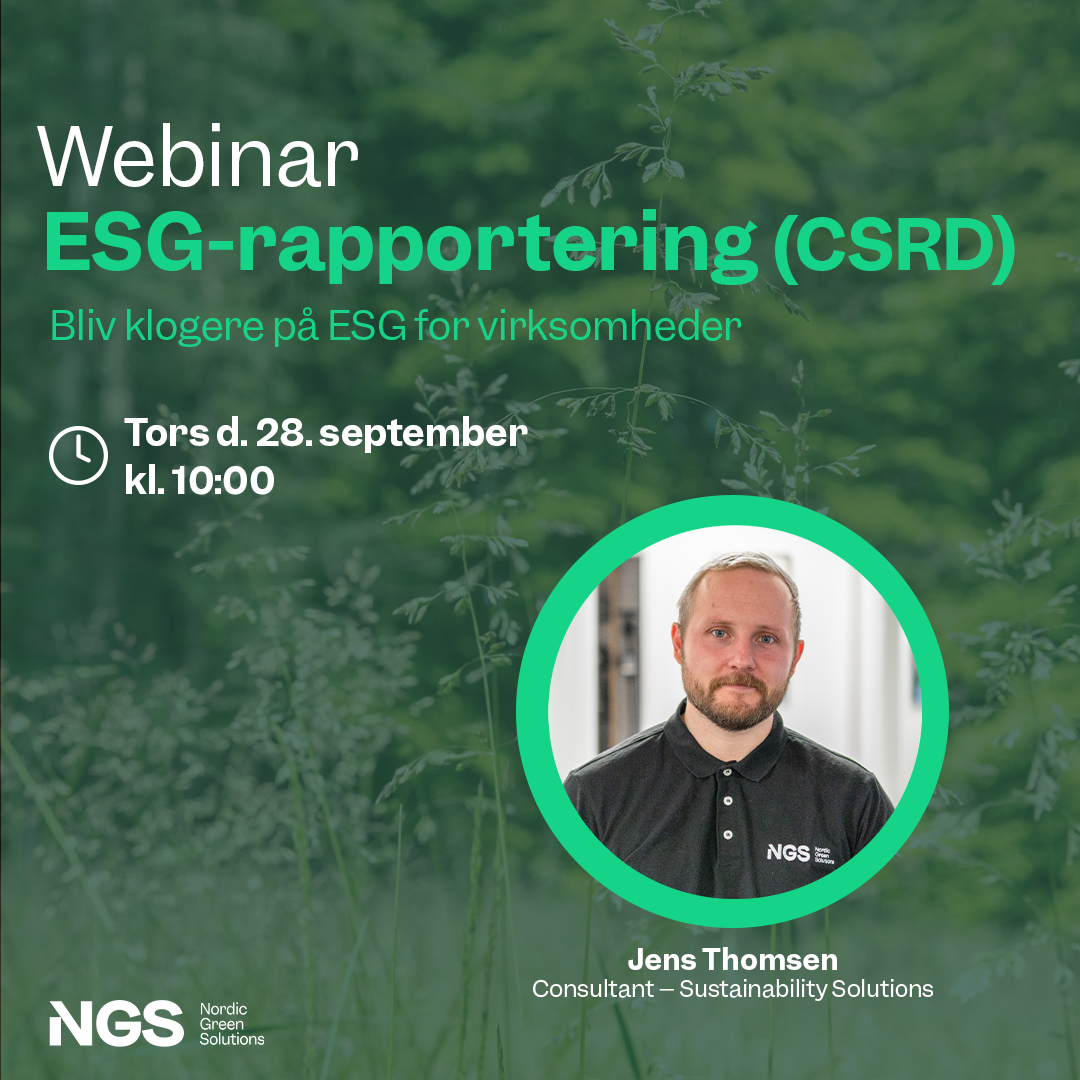ESG
(Environment, Social & Governance)
is a collective term for factors used to evaluate a company’s sustainability performance.
ESG is an analytical method used to evaluate companies’ performance regarding sustainability and social responsibility.
ESG reporting is a legal requirement that will affect all Danish companies over time. Therefore, all companies must consider and actively work with it. The sooner you get started, the more benefits you can achieve faster, such as increased interest from customers and suppliers, better credit ratings, brand value, innovation, and efficiency, among others.
Download our free guide below and learn more about what ESG is and how your company can best start its reporting. We will provide more information about the new CSR directive (CSRD), the new reporting standards (ESRS), and double materiality analysis, among other topics.
How does ESG affect your company?
Interest from customers and suppliers
Interest can be influenced by the lack of ESG reporting, as large companies are required to report environmental impacts and stakeholders desire sustainable and responsible partners.
Credit rating
ESG reporting can strengthen your company’s creditworthiness in the financial sector by documenting its sustainability. At the same time, the report provides the bank with a better understanding of risks and opportunities, which can increase loan flexibility.
Investors
ESG reporting is important for investors as it provides insight into the company’s sustainability and influences its financial performance and reputation. It can also lead to a higher valuation of the company.
Brand value
Environmental and sustainability initiatives impact the company’s brand value. Negative perception can lead to loss of customers and reputation, while sustainability can be an advantage in a time of increasing focus on responsibility.
Economic gain
Sustainability can indeed be an economically advantageous strategy. The sooner you begin to reduce your CO2 emissions and energy consumption, the sooner you will be able to achieve economic savings.
When does ESG affect your company?
*These are the overarching requirements. Guidelines may vary depending on the specific company and the sector they belong to.
January 1, 2024
Listed companies (accounting class D) +500 employees
January 1, 2025
Listed companies (accounting class C) +250 employees
January 1, 2026
Listed companies (accounting class D) +250 employees
January 1, 2028
Third-country companies with significant activities in the EU
Terms you will encounter in connection with ESG reporting
CSRD
Corporate Sustainability Reporting Directive
This is a European legislative framework aimed at standardizing and strengthening sustainability reporting for companies in the EU. CSRD requires companies to communicate their goals, strategies, and results in areas such as human rights, labor conditions, environmental impact, and financial responsibility.
See our videos about CSRD on YouTube >
ESRS
European Sustainability Reporting Standards
Dette er en samling af standarder og retningslinjer designet til at guide virksomheder i bæredygtighedsrapporteringen, så der etableres en mere ensartet og sammenlignelig tilgang til rapporteringen. Standarderne adresserer forskellige indenfor miljømæssige, sociale og governance-aspekter (ESG)
Double materiality assessment
Double materiality essentially means that the company must evaluate sustainability-related topics. It can, for example, be topics such as climate change. How can climate change affect the company? And how can the company itself affect climate change?
3 tips to get started
1: Start as early as possible
so you have sufficient time to set everything up before the auditor needs to be involved for review.
2: Perform a double materiality analysis
to gain an overview and identify the most critical ESG areas for your company, it may be advantageous to perform a double materiality analysis.
3: Begin with a few areas first
and gradually build from there. Prioritize the identified areas and focus on establishing clear KPIs, processes, and reporting methods for the most significant areas first.

CASE:
ESG-reporting for biomega®
Through a strong and strategic cooperation biomega® has succeeded in completing their report in an impressive short timeframe of just 8 weeks.
Do you need help with ESG-reporting?
It can seem like a daunting task when navigating through the concepts and figuring out how your company should get started with reporting.
At NGS, we can help your company get off to a good start and, most importantly, reach the finish line with your ESG report.

